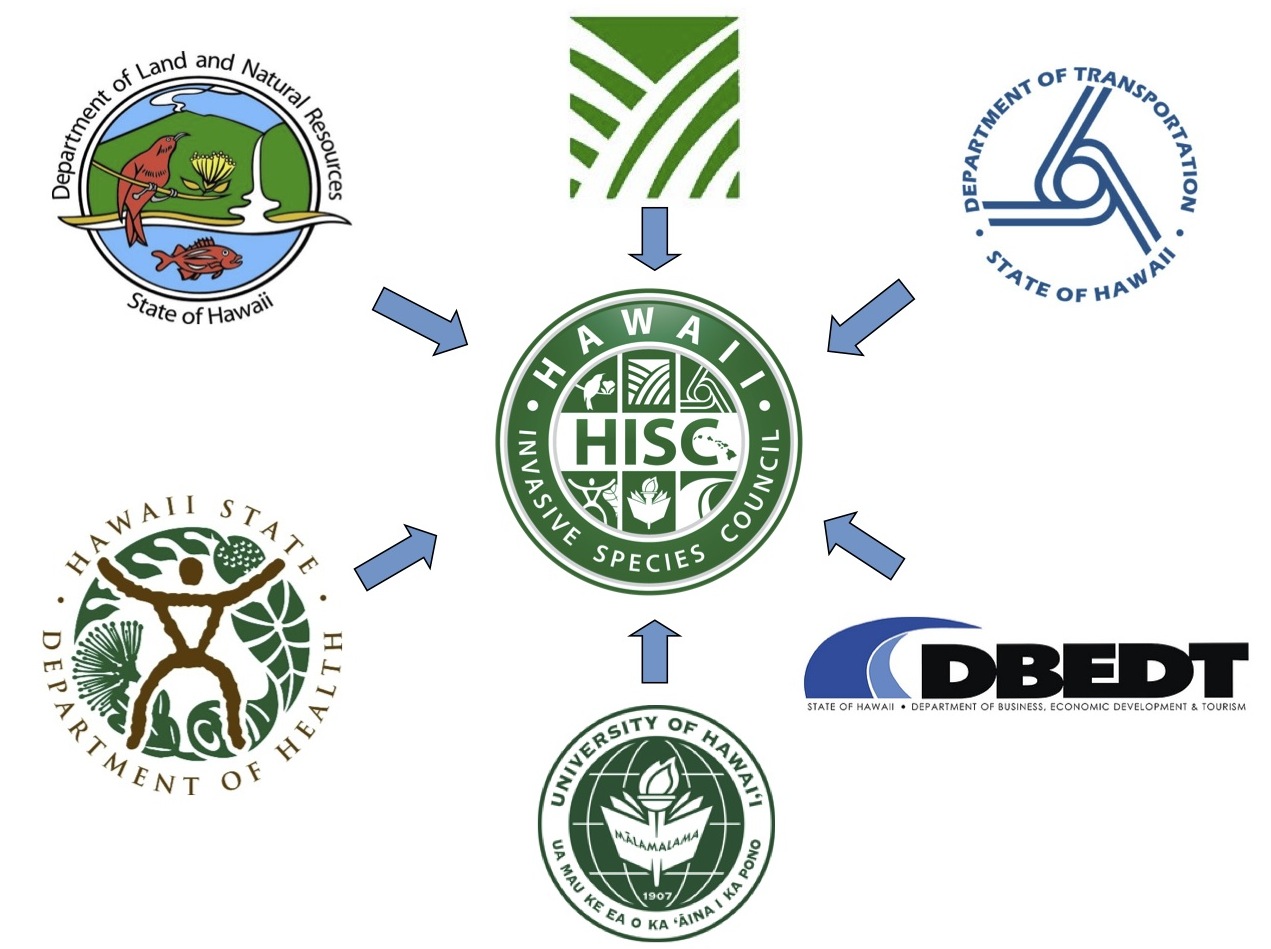The Hawaii Invasive Species Council (HISC) is a State interdepartmental collaboration established in 2003 by Hawaii’s State Legislature. The HISC was created to provide policy level direction, coordination, and planning among state departments, federal agencies, and international and local initiatives for the control and eradication of harmful invasive species infestations throughout the State and for preventing the introduction of other invasive species that may be potentially harmful. The HISC was authorized by Chapter 194, Hawaii Revised Statutes, in response to a 2002 State Legislative Reference Bureau study identifying the need to address a number of gaps in invasive species management statewide. The Legislative Reference Bureau provided a detailed update to this study in 2015 titled Can’t See the Forest for the (Albizia) Trees: An Invasive Species Update.

The HISC voting membership is mandated as the chair, director, or designee of the following agencies:
- Hawaii Department of Land and Natural Resources (HISC co-chair)
- Hawaii Department of Agriculture (HISC co-chair)
- Hawaii Department of Health
- Hawaii Department of Business, Economic Development and Tourism
- Hawaii Department of Transportation
- University of Hawaii
In addition, the leaders of the following Departments and organizations are invited as non-voting participants in HISC meetings to enhance interagency dialogue:
- State Senators and Representatives
- Additional state agencies
- County Mayors
- Federal agency representatives from the U.S. Departments of the Interior, Agriculture, and Defense.
The Council provides direction to HISC Support Staff to carry out Council directives and to administer HISC funding. The HISC is housed within the DLNR for administrative purposes only; therefore the program is administered by the DLNR Invasive Species Coordinator and is supported by other staff housed within the Division of Forestry and Wildlife.
The HISC aims to maintain a comprehensive overview of issues and implement a state-wide invasive species prevention, early detection and control program for terrestrial and aquatic invaders. The focus is on programmatic and capacity shortfalls not currently addressed by state agencies. It is hoped that the HISC funded projects will be a testing ground for new methods and capacity to address invasive species, that over time will be adopted permanently by agencies, thereby freeing up HISC resources to further promote innovation and address gaps in the overall effort to effectively manage invasive species.
Voting Council Members
Current agency chairs, directors or designees comprising the voting membership of the HISC include:
- , Co-Chair Dawn Chang, DLNR
- Co-Chair Sharon Hurd, HDOA
- Kathleen Ho, Deputy Director of Environmental Health Administration, DOH
- Mary Alice Evans, Office of Planning and Sustainable Development, DBEDT
- Tammy Lee, First Deputy of DOT
- Parwinder Grewal, Dean of UH-College of Tropical Agriculture and Human Resources
Legislative Members
Per Chapter 194, HRS, the President of the Senate and the Speaker of the House may designate a senator and a representative from each county to participate in Council meetings. Current participants include:
- Senate President Ron Kouchi – Kauaʻi
- Representative Luke Evslin – Kauaʻi
- Senator Mike Gabbard – Oʻahu
- Representative Lisa Marten – Oʻahu
- Representative Elle Cochran – Maui Nui
- Senator Lynn DeCoite – Maui Nui
- Senator Lorraine Inouye – Hawaiʻi Island
- Representative Kirstin Kahaloa- Hawaiʻi Island
Working Groups
HISC Support staff and the Coordinating Group on Alien Pest Species (CGAPS) coordinate five informal working groups pertaining to various invasive species issues, including Prevention / Early Detection & Rapid Response, Aquatic Biosecurity, Outreach, and Resources. The purpose of the working groups is to assist in implementing the objectives and strategies of the HISC& CGAPS Joint 2025 Strategy.
Relationship to other Programs
The HISC is an interagency government body, and while it partners closely with other agencies and non-governmental entities, it does not manage other organizations. Rather, the HISC supports certain projects and initiatives through policy recommendations and funding support.